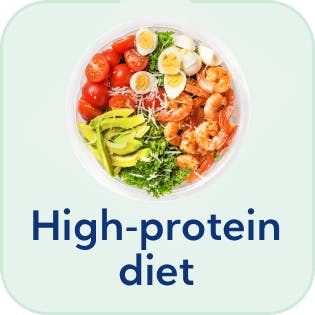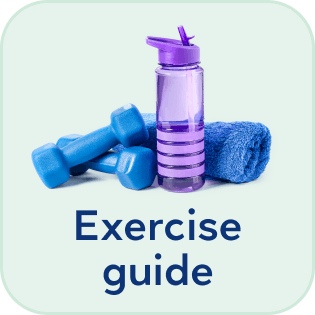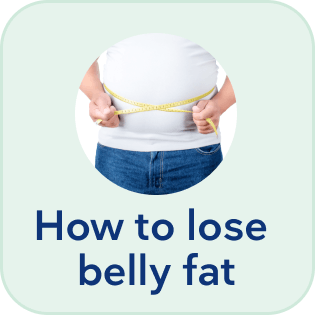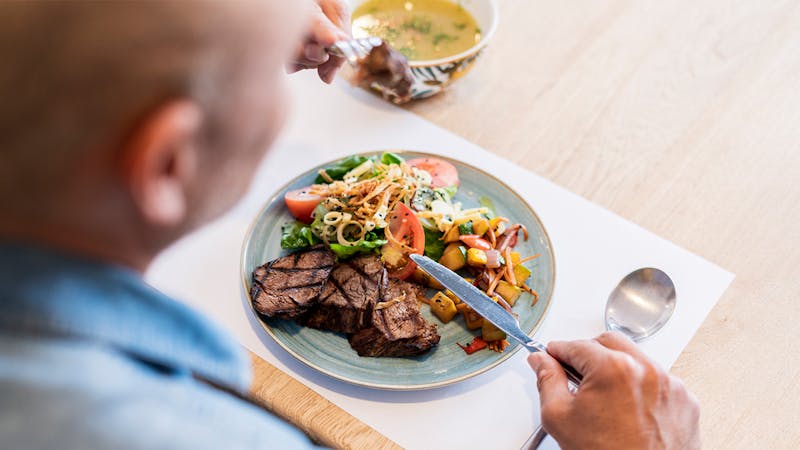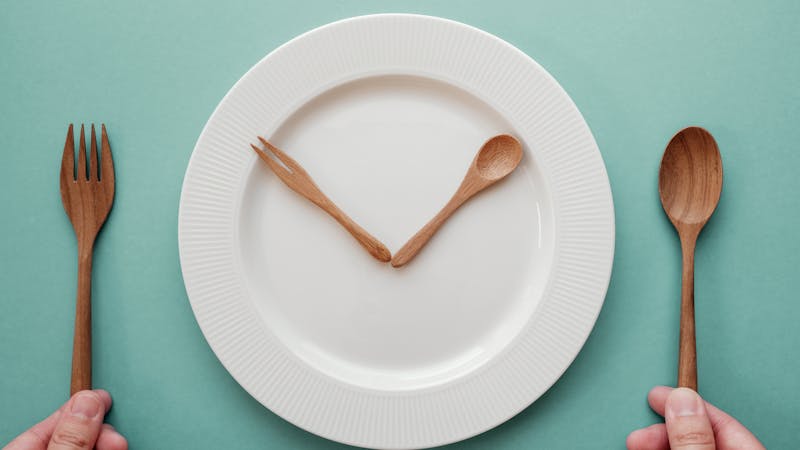Your complete guide to intermittent fasting
Evidence based
Intermittent fasting has become one of the most popular and possibly easiest means for weight loss and better health. For some, fasting may sound scary and uncomfortable, but it doesn’t have to be. In this guide, you’ll learn all you need to know to get started with a successful intermittent fasting routine.
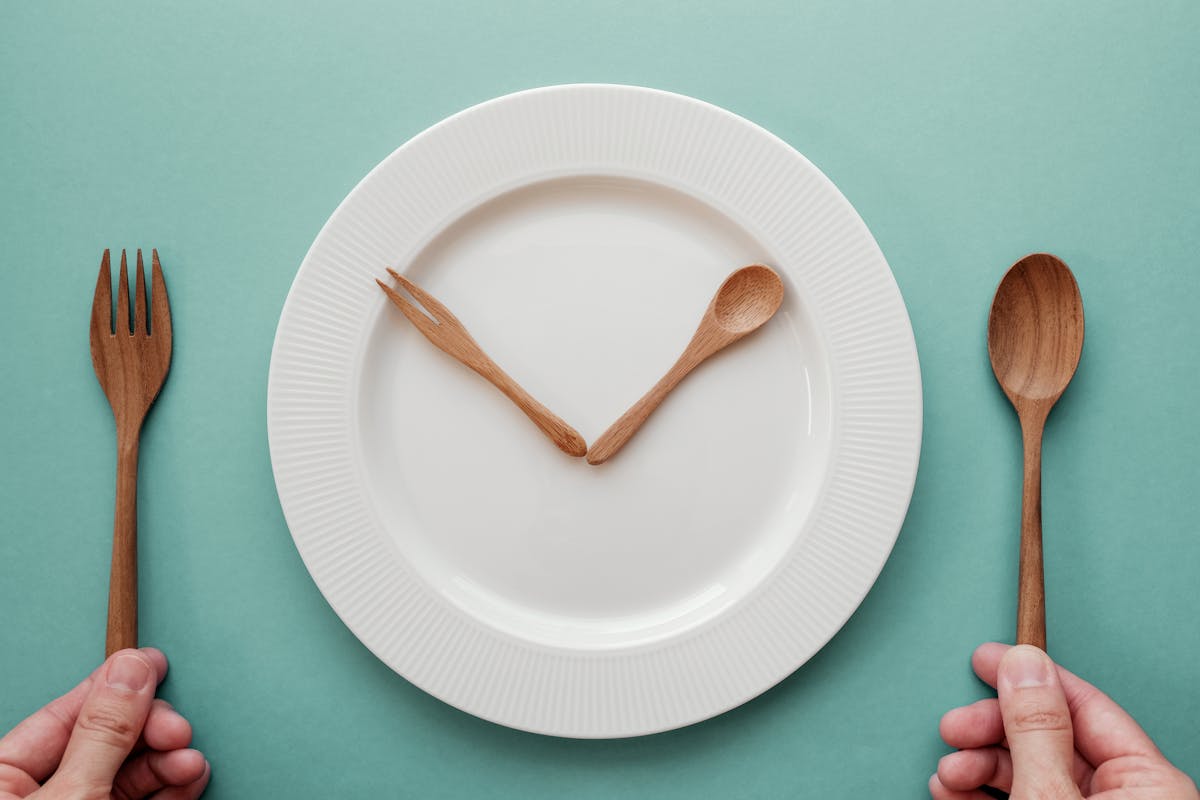

What is intermittent fasting?
Intermittent fasting, often abbreviated as IF, is any voluntary time period where you go without food. It is not a diet, per se, since it doesn’t specify what to eat; it only specifies when to eat.
You may be more likely to get better health benefits if you also pay attention to what kinds of foods you eat, but some studies involving IF that did not control what people ate still showed meaningful improvements.
One nonrandomized trial showed improved weight loss, blood sugar, and lipids with as little as 14 hours of daily fasting and no change in the participants’ baseline diet. However, that may not mean people can eat whatever they want during the eating window. Many clinicians feel their patients have more success with intermittent fasting when eating low-carb or higher protein diets, but there is currently insufficient evidence that pairing one particular type of diet with IF is superior to another.
While the buzz surrounding IF is recent, this practice isn’t new. Religious cultures have practiced it for centuries. And although accurate data are difficult to acquire, it is likely that hunter-gatherer societies and inhabitants of so-called Blue Zones have adjusted their meal frequency to one or two meals per day without snacks for generations. Now, it’s our turn to catch on.
Because the definition of IF is often different depending on the source you consult, it helps to clarify what we mean when we say “intermittent fasting.”
At Diet Doctor, we use intermittent fasting as an umbrella term, which encompasses the following:
Time-restricted eating, which we define as any fast less than 24 hours
Short-term fasting, which we define as fasting between 24 and 36 hours
Alternate day fasting, which we define as eating one day and fasting the next
Longer-term fasting, which we define as any fast greater than 36 hours
This guide will focus on time-restricted eating and short-term fasts. For longer-term fasts see our guide here. For alternate day fasting, see our full-length guide here.
How to get started
Intermittent fasting doesn’t have to be difficult. In fact, it shouldn’t be difficult at all!
All you have to do is allow more time between your meals. This can be as simple as stopping dinner at 7pm and not eating anything until 7am. That is a 12-hour fast. While a 12-hour fast hasn’t been studied in experimental trials, it logically seems like the first place to start with time-restricted eating — stop the after-dinner snacks.
The most common fasting or time-restricted eating regimens are as follows:
- 16:8. This means fasting for 16 hours and eating for 8 hours. For example, finish dinner at 7pm and have your first meal the next day at 11am. There are many other variations of this such as 14:10, 18:6, and 20:4.
- OMAD: This stands for “one meal a day.” As it sounds, this simply means eating only one meal for the entire day with no snacking. You can learn more about OMAD in our dedicated guide, What you need to know about OMAD.
- Alternate-Day Fasting (ADF): Finish dinner at 7pm Monday, don’t eat anything all day Tuesday, and have your first meal at breakfast or lunch on Wednesday. That’s an alternate-day fast. Read more about ADF here.
- 5:2. Eat normally for five days during the weak and fast or eat very low calories (around 500 calories) two days of the week. The two days do not have to be consecutive days.
When starting out, we recommend starting small and building up. That may mean starting with a 14:10 pattern three days per week. As that becomes easier, you can try increasing the fasting window and/or increasing the number of fasting days per week.
Remember, fasting in this sense means no food; it does not mean no drinking. Staying well hydrated is an important part of succeeding with intermittent fasting. The best drinks are free from calories and sweeteners, meaning still or sparkling water, and tea or coffee without any additives.
What does intermittent fasting do?
The main benefits of intermittent fasting are weight loss and improving metabolic health, including better blood sugar control in type 2 diabetes.
There are different mechanisms to account for the success of intermittent fasting.
First, skipping meals and cutting out snacking naturally reduces the amount of calories one eats during the day. That’s why it is important to try not to eat more during your eating window to “make up” for the missed meal. That would negate one of the main benefits of fasting!
The second potential reason for IF’s success is its ability to lower insulin levels. Studies show that fasting tends to lower insulin levels, although it is not scientifically clear the extent to which lower insulin levels can directly explain better weight loss.
However, a 2020 study from Dr. Ethan Weiss and colleagues created some doubt about whether short fasts of 16 hours, in the absence of any other dietary modification, can lead to improved weight loss and metabolic health. The study’s authors concluded that time restricted eating was no better than eating throughout the day for weight loss.
We wrote about this study, noting that the fasting group did not reduce caloric intake, which puts it at odds with other studies that have suggested at least part of the benefit of fasting comes from reduced caloric intake.
Clinicians familiar with intermittent fasting frequently report that people may respond differently to fasting — some may naturally restrict their calories, and others may feel increased hunger and increase their daily calories. Knowing if intermittent fasting increases your hunger or cravings may be an important consideration to predict your success with fasting.
One other exciting benefit of intermittent fasting is its potential contribution to longevity. While human research of this nature is limited and very difficult to do, animal models suggest that intermittent fasting can trigger autophagy, which is a term for cellular recycling and disposal of older and potentially diseased cells; this could eventually lead to longer lifespans. Does time restricted eating lead to living longer? We don’t have nearly enough data to draw any conclusions.
But even though human data on longevity are lacking, the other benefits of IF and its ease of use likely make it worth a try.
You can read more about the many impressive and inspiring success stories from people who have dramatically improved their health with intermittent fasting.
How to succeed with intermittent fasting
Since it saves time and money, many have no problem starting IF. Others, however, may find it challenging to start — especially when they are used to eating three meals and snacks every day. Here are some tips for success:
- Pick the right schedule to start. You may have the urge to start with three- or five-day fasts, but we recommend focusing on success with time-restricted eating first, starting where you feel most comfortable (14:10, 16:8, etc). Then, if you are finding success, consider gradually increasing the fasting window. Fasts of longer than 36 hours should generally be done under the supervision of an experienced health care provider.
- Stay hydrated. Fasting means not eating. It doesn’t mean not drinking. Not only will hydration help mitigate many side effects, but it also gives you something to do that mimics eating and puts something in your stomach. This can help both physically and psychologically to better ensure fasting success.
How do you know of you are well hydrated? You should have to urinate at least four times per day and your urine should be clear, not yellow. - Distract and occupy yourself during your usual meal and snack times. If we are honest with ourselves, most snacking isn’t to avoid malnutrition. It is a habit or a distraction. One solution is to distract yourself with something else! Go for a walk, read a book, play a game, do a crossword puzzle, or otherwise. Just do something to get you out of your snacking routine that will keep you from reflexively thinking about it.
- Make sure your meals are full of nutrient-dense foods with adequate protein. Studies show that keto diets and higher-protein diets help with satiety. That may be why many low-carb clinicians find people following these diets have greater success with fasting.
Read more about what we mean by adequate protein in our evidence-based guide. - Understand that hunger comes and goes in waves and is a natural feeling. It seems we have been trained to fear hunger and avoid it at all costs. But hunger is a natural feeling that we can learn to acknowledge and then ignore. You may find it goes away just as quickly as it came on.
By following these fasting tips, you will set yourself up for success and be much more likely to incorporate intermittent fasting as part of your daily routine.
You can also learn more about the potential side effects of intermittent fasting in our evidence-based guide.
Fasting precautions and who should not fast
Most people can safely and successfully incorporate fasting into their daily lives with few, if any, side effects. However, there are some specific individuals who should avoid fasting, or at least do so under the careful guidance of an experienced clinician.
- Pregnancy and breastfeeding both significantly increase energy demands in the mother. Fasting may deprive her and her baby of essential calories and nutrients.
- Women trying to get pregnant may find fasting disrupts their menstrual cycle and lowers their fertility. However, women with infertility from PCOS may find benefit with low-carb diets and possibly with time-restricted eating. This should be monitored with an experienced clinician.
- Kids have higher energy demands due to their rapid growth rates. Fasting is generally not appropriate or safe.
- Anyone who is underweight or malnourished should also avoid fasting.
- Anyone with a history of eating disorders such as anorexia or bulimia should avoid fasting, as it could trigger eating disorder tendencies. Also, a history of anorexia or bulimia may alter the perception of being underweight or malnourished, potentially placing the individual at risk with fasting.
- Anyone taking medications that lower blood sugar — such as insulin, sulfonylureas, and others — should only fast with the guidance of an experienced clinician. You can provide your clinician with this handout that gives guidance on how to best manage these medications with fasting. However, you should not attempt this on your own, as there is a significant risk of dangerous and potentially life-threatening low blood sugar levels.
FAQ
Will I also lose muscle when I fast?
Most of the data regarding fasting and muscle loss come from studies looking at fasting for days to weeks. In our in our evidence based guide we examine the most relevant scientific research about IF, concluding that it’s very unlikely to see significant muscle loss with IF, especially if eating adequate protein and engaging in resistance training.
Can I work out when I fast?
Yes! You definitely can. In fact, exercising while fasting is a good way to deplete glycogen stores and tap into fat stores for energy. However, it is not clear if fasted exercise leads to greater weight or fat mass loss.
While high-intensity exercise or prolonged exercise in non-fat adapted individuals may be challenging, most people find no trouble at all with moderate-intensity exercise and resistance training when fasting.
Isn’t breakfast the most important meal of the day?
No! While that is a message we have heard for decades, there is no science to support the claim. In fact, scientific studies show the opposite — there is no need to eat breakfast. Skipping your morning meal gives your body more time to burn fat for energy. Since hunger is lowest in the morning, it may be easiest to skip breakfast and break your fast later in the day.
Can kids or the elderly fast?
As we mentioned in our precautions section, kids should not fast given their energy demands for growth. Elderly people, on the other hand, have no specific contraindication to fasting as long as they don’t have an underlying illness that may preclude them from doing so.
Summary
In summary, intermittent fasting or time restricted eating could be the easiest way to improve your metabolic health and lose weight. It saves time, saves money, and you can succeed no matter what your preferred dietary pattern.
The key is doing it in a way that feels sustainable and fits into your lifestyle. Give it a try!
These results are not consistent across all studies, as we detail later in this guide.
Cell Metabolism 2020: Ten-hour time-restricted eating reduces weight, blood pressure, and atherogenic lipids in patients with metabolic syndrome [nonrandomized study, weak evidence]
This is based on clinical experience of low-carb practitioners and was unanimously agreed upon by our low-carb expert panel. You can learn more about our panel here [weak evidence].
Currently, the literature lacks intermittent fasting or time restricted eating studies comparing different baseline diets, so for now we must rely upon clinical experience.
Nutrition Journal 2010: The impact of religious fasting on human health [overview article; ungraded]
High quality data to prove this claim are hard to find, but the following references suggest that it may be the case.
European Journal of Clinical Nutrition 2002: The paradoxical nature of hunter-gatherer diets: meat-based, yet non-atherogenic [review article, ungraded]
BMC Public Health 2003: Effects of Greek Orthodox Christian Church fasting on serum lipids and obesity [observational study; weak evidence]
Procedures of the Natural Academy of Science U.S.A 2014: Meal frequency and timing in health and disease [overview article; ungraded]
These are the definitions we use at Diet Doctor. As of yet, there are no universally accepted definitions of time-restricted eating and short- or long-term fasts.
This is based on clinical experience of low-carb practitioners and was unanimously agreed upon by our low-carb expert panel. You can learn more about our panel here [weak evidence].
Many of the studies regarding intermittent fasting and weight loss investigated restricting calories to very low levels for a limited time, like one or more days per week (eg, 500 calories per day). Actual fasting means restricting calories to nearly zero for a time, so it may or may not be more effective.
JBI Database of Systematic Reviews and Implementation Reports 2018: Intermittent fasting interventions for treatment of overweight and obesity in adults: a systematic review and meta-analysis [strong evidence]
Obesity Reviews 2017: Short‐term intermittent energy restriction interventions for weight management: a systematic review and meta‐analysis [strong evidence]
Obesity (Silver Spring) 2016: A randomized pilot study comparing zero-calorie alternate-day fasting to daily caloric restriction in adults with obesity [moderate evidence]
The American Journal of Clinical Nutrition 2015: Health effects of intermittent fasting: hormesis or harm? A systematic review [systematic review of RCTs and observational studies; moderate evidence]
Intermittent fasting and type 2 diabetes:
JAMA Network Open 2018: Effect of intermittent compared with continuous energy restricted diet on glycemic control in patients with type 2 diabetes: a randomized noninferiority trial [moderate evidence]
Diabetes Research and Clinical Practice 2016: The effects of intermittent compared to continuous energy restriction on glycaemic control in type 2 diabetes; a pragmatic pilot trial [moderate evidence]
BMJ Case Reports 2018: Therapeutic use of intermittent fasting for people with type 2 diabetes as an alternative to insulin [case reports, very weak evidence]
In addition to being responsible for controlling blood sugar levels, higher insulin levels also promote the storage of fat.
The following studies show reduced insulin levels with intermittent fasting, some of which also demonstrate improved fat mass loss. While this does not prove cause and effect, it makes the mechanistic hypothesis plausible. Further studies are required for definitive proof of cause and effect.
International Journal of Obesity 2011: The effects of intermittent or continuous energy restriction on weight loss and metabolic disease risk markers: a randomised trial in young overweight women [moderate evidence]
The following study was a systematic review of 4 RCTs selected using the GRADE system to pick the highest-quality evidence available.
Cureus 2018: Intermittent fasting: the choice for a healthier lifestyle [systematic review of randomized trials; strong evidence]
The following study showed similar timing of insulin secretion with short term fasting but at a much lower amplitude, therefore making the overall insulin levels persistently higher for the regularly eating cohort.
Diabetes 2002: Effects of fasting on physiologically pulsatile insulin release in healthy humans [nonrandomized study, weak evidence]
The following study showed fasting improved HOMA-IR, which is a measurement of insulin sensitivity.
Journal of Clinical Medicine 2019: The Effectiveness of Intermittent Fasting to Reduce Body Mass Index and Glucose Metabolism: A Systematic Review and Meta-Analysis [systematic review of randomized trials; strong evidence]
JAMA Internal Medicine 2020: Effects of time-restricted eating on weight loss and other metabolic parameters in women and men with overweight and obesity [randomized trial; moderate evidence]
As we mentioned earlier, this nonrandomized study reported significant metabolic health benefits with 14 hours of fasting even in the absence of any advice about what or how much to eat. One explanation is that the subjects ate better than their usual diet simply because they were being monitored as part of a study — sometimes called “the Hawthorne effect.”
This is based on the consistent clinical experience of practitioners familiar with intermittent fasting. [weak evidence]
Aging Research Reviews 2016: Impact of intermittent fasting on health and disease processes [overview article]
Cell Metabolism 2014: Fasting: molecular mechanisms and clinical applications [overview article]
NEJM 2019: Effects of Intermittent Fasting on Health, Aging, and Disease [overview article; ungraded]
Other potential mechanisms include the impact on mTOR
Nutrients 2020: Mechanisms of Lifespan Regulation by Calorie Restriction and Intermittent Fasting in Model Organisms [overview article; ungraded]
This is based on clinical experience of low-carb practitioners and was unanimously agreed upon by our low-carb expert panel. You can learn more about our panel here [weak evidence].
Obesity Reviews 2015: Do ketogenic diets really suppress appetite? A systematic review and meta-analysis [strong evidence]
European Journal of Clinical Nutrition 2013: Ketosis and appetite-mediating nutrients and hormones after weight loss [non-controlled study; weak evidence]
In fact, several studies have shown that when people dramatically cut back on carbs but are allowed as much protein and fat as they want, they end up automatically eating less because they’re no longer as hungry.
Annals of Internal Medicine 2014: Effects of low-carbohydrate and low-fat diets; a randomized trial [moderate evidence]
Annals of Internal Medicine 2005: Effect of a low-carbohydrate diet on appetite, blood glucose levels, and insulin resistance in obese patients with type 2 diabetes [non-randomized trial; weak evidence]
Nutrition & Metabolism 2005: A low-carbohydrate, ketogenic diet to treat type 2 diabetes [non-controlled trial; weak evidence]
International Journal of General medicine 2013: Hunger can be taught: Hunger recognition regulates eating and improves energy balance [overview article; ungraded]
This is based on the consistent clinical experience of practitioners familiar with intermittent fasting. [weak evidence]
In shorter studies, most data suggest that muscle loss is not an issue. In a 2016 randomized, controlled trial, obese adults were assigned to either fast every other day or eat a calorie-restricted diet every day for eight weeks. Those in the intermittent fasting group showed less slowing in metabolic rate and greater improvement in body composition after 32 weeks of follow up compared to people in the calorie-restricted group:
Obesity (Silver Spring) 2016: A randomized pilot study comparing zero-calorie alternate-day fasting to daily caloric restriction in adults with obesity [moderate evidence]
Other studies of intermittent fasting have shown beneficial effects on metabolic rate and/or body composition:
American Journal of Clinical Nutrition 2007: A controlled trial of reduced meal frequency without caloric restriction in healthy, normal-weight, middle-aged adults [moderate evidence]
American Journal of Clinical Nutrition 2000: Resting energy expenditure in short-term starvation is increased as a result of an increase in serum norepinephrine [weak evidence]
The American Journal of Clinical Nutrition 2005: Alternate-day fasting in nonobese subjects: effects on body weight, body composition, and energy metabolism [weak evidence]
Journal of International Science and Sports Nutrition 2014: Body composition changes associated with fasted versus non-fasted aerobic exercise [randomized trial; moderate evidence]
Scandinavian Journal of Medicine & Science in Sports 2018: Effects of fasted vs fed-state exercise on performance and post-exercise metabolism: A systematic review and meta-analysis [meta-analysis of randomized and non-randomized studies; moderate evidence]
The term “fat adapted” refers to the ability to efficiently produce energy from fat instead of glucose.
The old idea that breakfast is important for health or weight control is mainly based on observational studies, a notoriously weak form of evidence.
When tested, this idea does not appear to hold up, at least not for weight loss. A recent meta-analysis of randomized clinical trials found that people assigned to skip breakfast ate less overall and lost more weight than those assigned to eat breakfast daily:
British Medical Journal 2019: Effect of breakfast on weight and energy intake: systematic review and meta-analysis of randomised controlled trials [strong evidence]
Even the observational data is inconsistent, for example, with this finding from the study below: “Compared to breakfast eating, skipping breakfast was significantly associated with better health-related quality of life and lower perceived stress.”
International Journal of Environmental Research and Public Health 2018: Eat or skip breakfast? The important role of breakfast quality for health-related quality of life, stress and depression in Spanish adolescents [observational study; weak evidence]
Obesity (Silver Spring) 2013: The internal circadian clock increases hunger and appetite in the evening independent of food intake and other behaviors [non-randomized study; weak evidence]
Your complete guide to intermittent fasting - the evidence
This guide is written by Dr. Bret Scher, MD and was last updated on June 19, 2025. It was medically reviewed by Dr. Michael Tamber, MD.
The guide contains scientific references. You can find these in the notes throughout the text, and click the links to read the peer-reviewed scientific papers. When appropriate we include a grading of the strength of the evidence, with a link to our policy on this. Our evidence-based guides are updated at least once per year to reflect and reference the latest science on the topic.
All our evidence-based health guides are written or reviewed by medical doctors who are experts on the topic. To stay unbiased we show no ads, sell no physical products, and take no money from the industry. We're fully funded by the people, via an optional membership. Most information at Diet Doctor is free forever.
Read more about our policies and work with evidence-based guides, nutritional controversies, our editorial team, and our medical review board.
Should you find any inaccuracy in this guide, please email andreas@dietdoctor.com.



